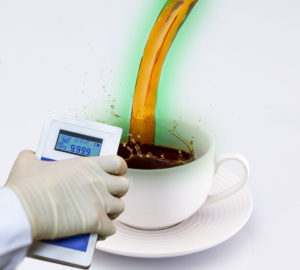The link between coffee consumption and decreased instances of neurodegenerative diseases like Alzheimer’s and Parkinson’s have been pretty well established at this point. We’ve seen study after study after study… after study (after study). All those findings, though, have been preventative in nature. But there’s a new study that finds coffee may actually be a useful treatment in early-stage neurodegenerative diseases.
As reported by Phys.org, the new findings were recently published in the journal Environmental Research. In it, researchers from the University of Texas, El Paso used spent coffee grounds to create “caffeic-acid based Carbon Quantum Dots” (CACQDs). Caffeic acid is a polyphenol found in abundance in coffee grounds that has the unique property of being able to “penetrate the blood-brain barrier… thus able to exert its effects upon the cells inside the brain,” per Mahesh Narayan, Ph.D., a professor and Fellow of the Royal Society of Chemistry at UTEP’s Department of Chemistry and Biology.
To extract the CACQDs, researchers cooked coffee grounds at 200°C (392°F) for four hours, to “reorient the caffeic acid’s carbon structure and form CACQDs.”
Neurogenerative diseases like Alzheimer’s and Parkinson’s are normally formed by a build-up of harmful molecules known as free radicals as well as the accrual of fragments of “amyloid-forming proteins” that can result in plaque and fibrils in the brain.
In “test tube experiments, cell lines and other models of Parkinson’s disease when the disorder was caused by a pesticide called paraquat,” the researchers found the CACQDs were able to not only prevent the accumulation of free radicals and other fragments, which other studies have found coffee is able to do, but that they were able to actually remove the neurodegenerative disease-causing agents. This is significant because it offers a potential to offer a cure for these diseases when treated in their early stages.
There are currently no known cures for Parkinson’s disease or Alzheimer’s, but with these new findings there is hope, even if that hope is still a long way from becoming a reality. The end goal for the researchers would be some form of medication, like a pill, that could work to prevent—and in some instances, cure—neurogenerative diseases of this type.
And it all starts with used coffee grounds. Cheap, eco-friendly, and otherwise thrown away coffee grounds. So keep drinking that coffee. You’re helping Science.
Zac Cadwalader is the managing editor at Sprudge Media Network and a staff writer based in Dallas. Read more Zac Cadwalader on Sprudge.






























